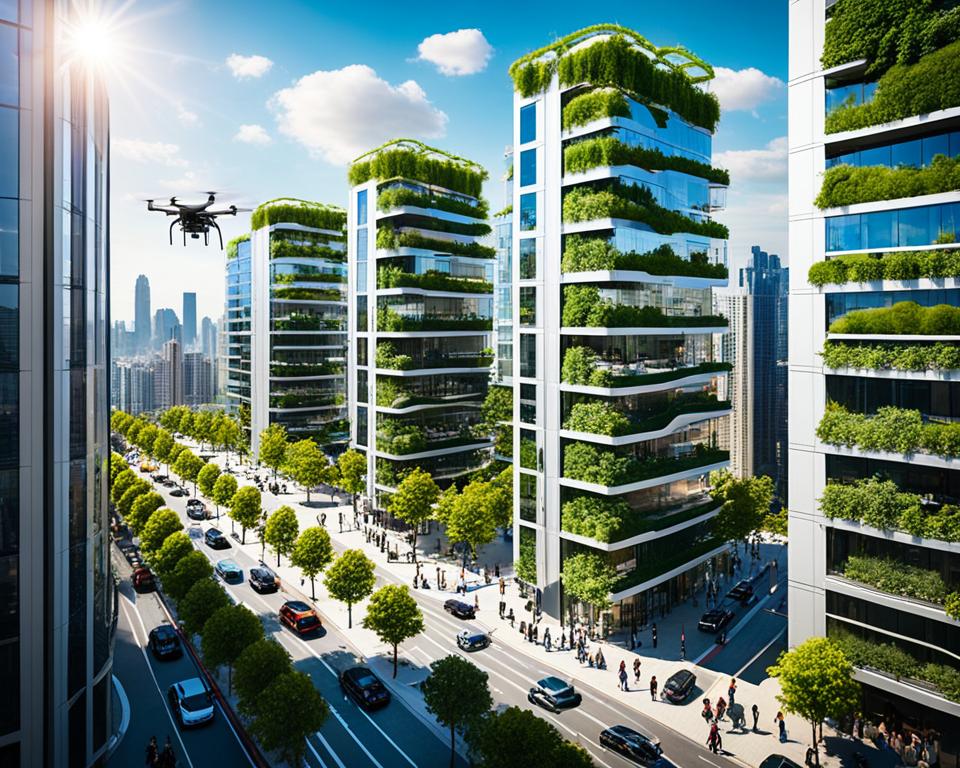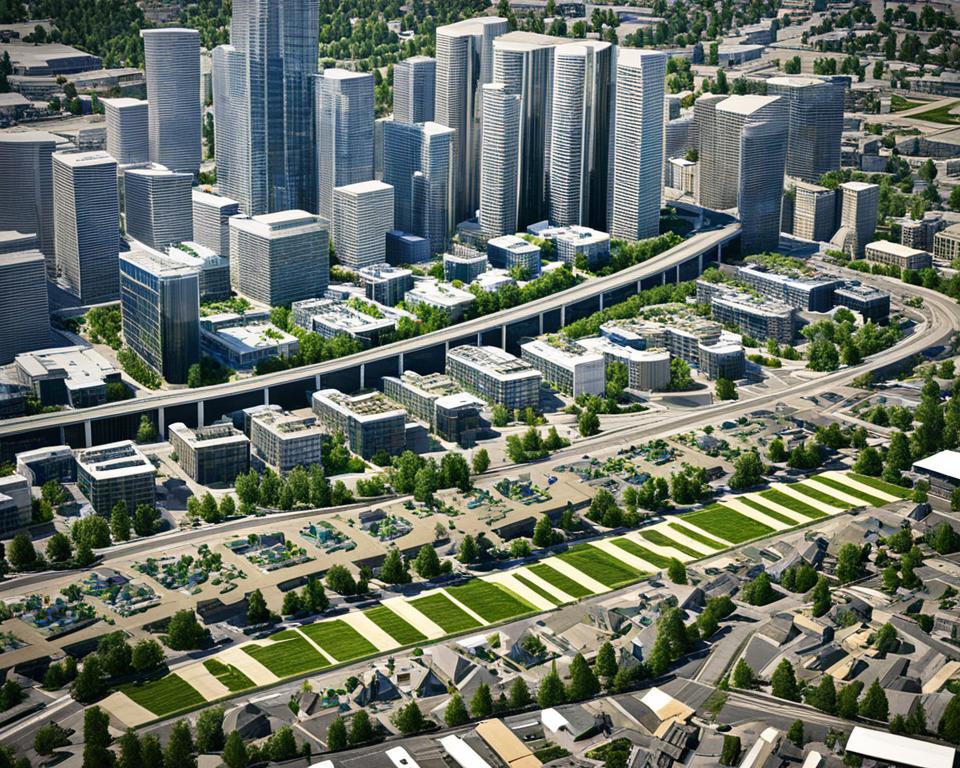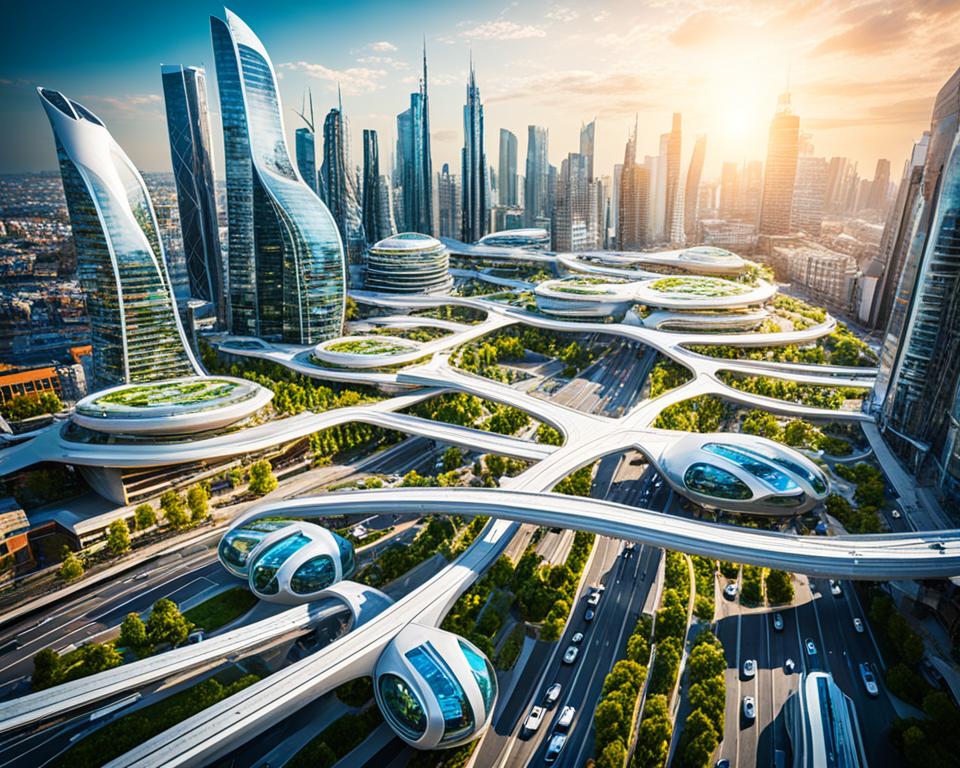The world is getting more digital, and “smart cities” are changing how we live. They use new tech like the Internet of Things (IoT), artificial intelligence (AI), blockchain, and big data analytics. This makes cities more efficient, sustainable, and better places to live.
Smart cities focus on using technology in a way that makes life better. They use data from sensors and devices to manage things like traffic and energy use. This makes cities more flexible and able to meet the needs of their people.
Smart cities are bringing new solutions to our daily lives. They make things like public transport and resource use better. This change is making cities more connected and vibrant, offering a brighter future for everyone.
The Foundation of Smart Cities
Smart cities are built on the latest technologies working together. They make cities better places to live, work, and connect. The Internet of Things (IoT) acts like the city’s nervous system. Artificial intelligence (AI) is like the brain, making decisions and improving life.
Internet of Things (IoT): The Nervous System
The Internet of Things is key to smart cities. It’s a network of devices and sensors in the city. This IoT system helps manage things like traffic, energy use, and safety. It makes cities run better by using data from these devices.
Artificial Intelligence (AI): The Brain
Artificial intelligence helps smart cities make smart choices. It looks at lots of data from the IoT to find patterns. This helps plan the city, make policies, and use resources well. AI is like the “brain” of smart cities, making them run smoothly and sustainably.
Blockchain: A Secure and Transparent Framework
Blockchain makes smart cities safe and open. It’s a secure way to handle money and data. This means cities can trust their systems and keep citizens and businesses safe.
Big Data Analytics: Extracting Meaningful Insights
Smart cities have a lot of data from their devices and systems. Big data analytics helps make sense of this data. This way, cities can improve and make better decisions for everyone.
“The foundation of smart cities is a symphony of interconnected technologies, each playing a vital role in transforming urban living for a more connected, efficient, and sustainable future.”
Key Features and Applications
Smart cities are changing urban life with new technologies. They make cities more efficient, sustainable, and better for everyone living there. These cities use advanced tech to manage resources better and keep people safe.
Efficient Resource Management
Smart cities manage resources well. They use sensors and smart meters to keep an eye on water, energy, and waste. This helps save resources and support green practices.
Enhanced Public Transportation
Smart cities are changing how we get around. With real-time data and apps, people can plan their trips better. These systems also help reduce traffic and encourage greener travel.
Public Safety and Security
Smart cities use tech to keep people safe. They have advanced cameras and AI to spot and act on threats. Early warning systems and emergency plans help during disasters.
Sustainable Urban Development
Smart cities focus on being green. They use tech to support the environment and green living. This includes green buildings and smart grids that use data to save resources and cut down on pollution.
| Smart City Feature | Description | Impact |
|---|---|---|
| Efficient Resource Management | Utilization of sensors and smart meters to monitor and optimize water, energy, and waste systems | Reduced resource consumption, enhanced sustainability, and cost savings for residents |
| Enhanced Public Transportation | Leveraging real-time data and mobile apps to improve mobility, reduce congestion, and promote eco-friendly options | Increased accessibility, reduced traffic, and decreased carbon emissions |
| Public Safety and Security | Advanced surveillance systems, predictive policing, and emergency management technologies | Improved incident response, proactive crime prevention, and enhanced community safety |
| Sustainable Urban Development | Incorporation of green buildings, smart grids, and data-driven urban planning tools | Reduced environmental impact, increased energy efficiency, and enhanced livability |
The Rise of Smart Cities
Smart cities are changing the way we tackle urban challenges with technology. With more people moving to cities, smart cities use tech to manage issues like traffic, pollution, and infrastructure. This shift is crucial for a better quality of life in cities.
These cities use advanced technologies to make life better and more sustainable. They use Internet of Things (IoT), Artificial Intelligence (AI), and Big Data Analytics to improve our urban experience. This is how they’re changing how we live and interact with our cities.
Smart cities are solving many problems and opening new doors for growth. By embracing technology adoption, they’re setting a new standard for urban living. They’re making cities better places to live, work, and thrive in the future.
“The rise of smart cities represents a new frontier in urban development, where technology and innovation converge to create more livable, sustainable, and efficient urban environments.”
| Key Benefits of Smart Cities | Enabling Technologies |
|---|---|
|
|

As cities grow, smart cities offer a chance to solve modern urban challenges. They use technologies to change how we see and use our cities. This leads to more urban innovation and growth in smart cities.
Challenges and Considerations
Smart cities are becoming more common, but they face big challenges. These include privacy and security, the digital divide, and how to implement and govern them. These issues need to be solved to make cities better with technology.
Privacy and Security Concerns
Smart cities collect a lot of data from sensors and devices. This raises big questions about privacy and security. It’s important to find a balance between using data and protecting people’s privacy. Cities must also have strong cybersecurity to keep data safe from hackers.
Addressing the Digital Divide
The digital divide is a big problem in smart cities. Some people might not have access to the internet or devices, leaving them out. It’s important to make sure everyone can use smart city technology. This means making sure all citizens can join in and benefit from the city’s digital features.
Implementation and Governance Challenges
Putting smart city tech into action is hard. It needs many groups to work together, like governments, companies, and citizens. They must all agree and communicate well. Having clear rules and roles is key to making smart cities work and keeping people’s trust.
| Smart City Challenge | Description | Potential Impact |
|---|---|---|
| Privacy and Security | Balancing data utilization and individual privacy rights | Cybersecurity breaches, loss of public trust |
| Digital Divide | Ensuring equitable access to smart city technologies | Exacerbation of socioeconomic inequalities |
| Implementation and Governance | Coordinating stakeholders and establishing clear governance | Lack of coordination, public mistrust, and ineffective deployment |

As smart cities grow, solving these challenges is key. It’s about making cities safe, fair, and good for everyone. This way, cities can be better for all citizens.
Proptech: Catalyzing Smart City Advancements
Proptech combines property and technology, changing how we use urban spaces. It’s making property management better and changing how we buy and sell real estate. With smart building tech, cities use less energy and make buildings more comfortable for people.
Real-time data helps city planners make better decisions. This makes cities smarter and more efficient. Proptech is also changing how we get around, how we talk to our cities, and how we live sustainably.
It’s making cities more efficient, livable, and strong. Proptech and smart city ideas are changing our cities for the better. They make our cities more connected, sustainable, and prosperous.
Proptech is improving how buildings work and how citizens get involved. As real estate and tech merge, proptech will greatly improve city life. It’s set to make cities better in many ways.











